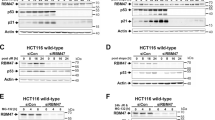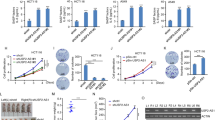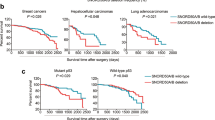Abstract
The RNA-binding protein (RBP) RNPC1 is a target of the p53 family and forms a feedback regulatory loop with the p53 family proteins. The murine double minute-2 (MDM2) oncogene, a key negative regulator of p53, has a critical role in a variety of fundamental cellular processes. MDM2 expression is found to be regulated via gene amplification, transcription, protein translation and protein stability. In the current study, we reported a novel regulation of MDM2 by RNPC1 via mRNA stability. Specifically, we found that overexpression of RNPC1 decreases, whereas knockdown or knockout of RNPC1 increases, the level of MDM2 transcript and protein independent of p53. To uncover the underlying mechanism, we found that RNPC1 is able to destabilize the MDM2 transcript via binding to multiple AU-/U-rich elements in MDM2 3′untranslated region (3′UTR). Consistent with this, we showed that RNPC1 inhibits expression of exogenous MDM2 from an expression vector as long as the vector contains an AU-/U-rich element from MDM2 3′UTR. Finally, we showed that the RNA-binding activity of RNPC1 is required for binding to MDM2 transcript and consequently, for inhibiting MDM2 expression. Together, we uncover a novel regulation of MDM2 by the RBP RNPC1 via mRNA stability.
This is a preview of subscription content, access via your institution
Access options
Subscribe to this journal
Receive 50 print issues and online access
$259.00 per year
only $5.18 per issue
Buy this article
- Purchase on Springer Link
- Instant access to full article PDF
Prices may be subject to local taxes which are calculated during checkout






Similar content being viewed by others
References
Cahilly-Snyder L, Yang-Feng T, Francke U, George DL . Molecular analysis and chromosomal mapping of amplified genes isolated from a transformed mouse 3T3 cell line. Somat Cell Mol Genet 1987; 13: 235–244.
Fakharzadeh SS, Trusko SP, George DL . Tumorigenic potential associated with enhanced expression of a gene that is amplified in a mouse tumor cell line. EMBO J 1991; 10: 1565–1569.
Momand J, Zambetti GP, Olson DC, George D, Levine AJ . The mdm-2 oncogene product forms a complex with the p53 protein and inhibits p53-mediated transactivation. Cell 1992; 69: 1237–1245.
Oliner JD, Pietenpol JA, Thiagalingam S, Gyuris J, Kinzler KW, Vogelstein B . Oncoprotein MDM2 conceals the activation domain of tumour suppressor p53. Nature 1993; 362: 857–860.
Haupt Y, Maya R, Kazaz A, Oren M . Mdm2 promotes the rapid degradation of p53. Nature 1997; 387: 296–299.
Honda R, Tanaka H, Yasuda H . Oncoprotein MDM2 is a ubiquitin ligase E3 for tumor suppressor p53. FEBS Lett 1997; 420: 25–27.
Kubbutat MH, Jones SN, Vousden KH . Regulation of p53 stability by Mdm2. Nature 1997; 387: 299–303.
Jones SN, Roe AE, Donehower LA, Bradley A . Rescue of embryonic lethality in Mdm2-deficient mice by absence of p53. Nature 1995; 378: 206–208.
Montes de Oca Luna R, Wagner DS, Lozano G . Rescue of early embryonic lethality in mdm2-deficient mice by deletion of p53. Nature 1995; 378: 203–206.
Bouska A, Eischen CM . Murine double minute 2: p53-independent roads lead to genome instability or death. Trends Biochem Sci 2009; 34: 279–286.
Ganguli G, Wasylyk B . p53-independent functions of MDM2. Mol Cancer Res 2003; 1: 1027–1035.
Barak Y, Juven T, Haffner R, Oren M . mdm2 expression is induced by wild type p53 activity. EMBO J 1993; 12: 461–468.
Zauberman A, Flusberg D, Haupt Y, Barak Y, Oren M . A functional p53-responsive intronic promoter is contained within the human mdm2 gene. Nucleic Acids Res 1995; 23: 2584–2592.
Trotta R, Vignudelli T, Candini O, Intine RV, Pecorari L, Guerzoni C et al. BCR/ABL activates mdm2 mRNA translation via the La antigen. Cancer Cell 2003; 3: 145–160.
Moumen A, Patané S, Porras A, Dono R, Maina F . Met acts on Mdm2 via mTOR to signal cell survival during development. Development 2007; 134: 1443–1451.
Xiong L, Kou F, Yang Y, Wu J . A novel role for IGF-1R in p53-mediated apoptosis through translational modulation of the p53-Mdm2 feedback loop. J Cell Biol 2007; 178: 995–1007.
Fang S, Jensen JP, Ludwig RL, Vousden KH, Weissman AM . Mdm2 is a RING finger-dependent ubiquitin protein ligase for itself and p53. J Biol Chem 2000; 275: 8945–8951.
Honda R, Yasuda H . Activity of MDM2, a ubiquitin ligase, toward p53 or itself is dependent on the RING finger domain of the ligase. Oncogene 2000; 19: 1473–1476.
Lohrum MA, Ludwig RL, Kubbutat MH, Hanlon M, Vousden KH . Regulation of HDM2 activity by the ribosomal protein L11. Cancer Cell 2003; 3: 577–587.
Zhang Y, Wolf GW, Bhat K, Jin A, Allio T, Burkhart WA et al. Ribosomal protein L11 negatively regulates oncoprotein MDM2 and mediates a p53-dependent ribosomal-stress checkpoint pathway. Mol Cell Biol 2003; 23: 8902–8912.
Dai MS, Lu H . Inhibition of MDM2-mediated p53 ubiquitination and degradation by ribosomal protein L5. J Biol Chem 2004; 279: 44475–44482.
Dai MS, Zeng SX, JIN Y, Sun XX, David L, Lu H . Ribosomal protein L23 activates p53 by inhibiting MDM2 function in response to ribosomal perturbation but not to translation inhibition. Mol Cell Biol 2004; 24: 7654–7668.
Jin A, Itahana K, O’Keefe K, Zhang Y . Inhibition of HDM2 and activation of p53 by ribosomal protein L23. Mol Cell Biol 2004; 24: 7669–7680.
Zhu Y, Poyurovsky MV, Li Y, Biderman L, Stahl J, Jacq X et al. Ribosomal protein S7 is both a regulator and a substrate of MDM2. Mol Cell 2009; 35: 316–326.
Xiong X, Zhao Y, He H, Sun Y . Ribosomal protein S27-like and S27 interplay with p53-MDM2 axis as a target, a substrate and a regulator. Oncogene 2011; 30: 1798–1811.
Shu L, Yan W, Chen X . RNPC1, an RNA-binding protein and a target of the p53 family, is required for maintaining the stability of the basal and stress-induced p21 transcript. Genes Dev 2006; 20: 2961–2972.
Zhang J, Jun Cho S, Chen X . RNPC1, an RNA-binding protein and a target of the p53 family, regulates p63 expression through mRNA stability. Proc Natl Acad Sci USA 2010; 107: 9614–9619.
Zhang J, Cho SJ, Shu L, Yan W, Guerrero T, Kent M et al. Translational repression of p53 by RNPC1, a p53 target overexpressed in lymphomas. Genes Dev 2011; 25: 1528–1543.
Cho SJ, Zhang J, Chen X . RNPC1 modulates the RNA-binding activity of, and cooperates with, HuR to regulate p21 mRNA stability. Nucleic Acids Res 2010; 38: 2256–2267.
Miyamoto S, Hidaka K, Jin D, Morisaki T . RNA-binding proteins Rbm38 and Rbm24 regulate myogenic differentiation via p21-dependent and -independent regulatory pathways. Genes Cells 2009; 14: 1241–1252.
Leveille N, Elkon R, Davalos V, Manoharan V, Hollingworth D, Oude Vrielink J et al. Selective inhibition of microRNA accessibility by RBM38 is required for p53 activity. Nat Commun 2011; 2: 513.
Pan Y, Chen J . MDM2 promotes ubiquitination and degradation of MDMX. Mol Cell Biol 2003; 23: 5113–5121.
Kawai H, Wiederschain D, Kitao H, Stuart J, Tsai KK, Yuan ZM . DNA damage-induced MDMX degradation is mediated by MDM2. J Biol Chem 2003; 278: 45946–45953.
Bartel F, Taubert H, Harris LC . Alternative and aberrant splicing of MDM2 mRNA in human cancer. Cancer Cell 2002; 2: 9–15.
Zhang J, Sun Q, Zhang Z, Ge S, Han ZG, Chen WT . Loss of microRNA-143/145 disturbs cellular growth and apoptosis of human epithelial cancers by impairing the MDM2-p53 feedback loop. Oncogene 2013; 32: 61–69.
Xiao J, Lin H, Luo X, Luo X, Wang Z . miR-605 joins p53 network to form a p53:miR-605:Mdm2 positive feedback loop in response to stress. EMBO J 2011; 30: 5021.
Ghosh M, Aquila HL, Michaud J, Ai Y, Wu MT, Hemmes A et al. Essential role of the RNA-binding protein HuR in progenitor cell survival in mice. J Clin Invest 2009; 119: 3530–3543.
Lukas J, Gao DQ, Keshmeshian M, Wen WH, Tsao-Wei D, Rosenberg S et al. Alternative and aberrant messenger RNA splicing of the mdm2 oncogene in invasive breast cancer. Cancer Res 2001; 61: 3212–3219.
Sigalas I, Calvert AH, Anderson JJ, Neal DE, Lunec J . Alternatively spliced mdm2 transcripts with loss of p53 binding domain sequences: transforming ability and frequent detection in human cancer. Nat Med 1996; 2: 912–917.
Cho SJ, Jung YS, Zhang J, Chen X . The RNA-binding protein RNPC1 stabilizes the mRNA encoding the RNA-binding protein HuR and cooperates with HuR to suppress cell proliferation. J Biol Chem 2012; 287: 14535–14544.
Yan W, Zhang J, Zhang Y, Jung YS, Chen X . P73 expression is regulated by RNPC1, a target of the p53 family, via mRNA stability. Mol Cell Biol (e-pub ahead of print 16 April 2012).
Giles KM, Daly JM, Beveridge DJ, Thomson AM, Voon DC, Furneaux HM et al. The 3′-untranslated region of p21WAF1 mRNA is a composite cis-acting sequence bound by RNA-binding proteins from breast cancer cells, including HuR and poly(C)-binding protein. J Biol Chem 2003; 278: 2937–2946.
Jung YS, Qian Y, Chen X . DNA polymerase eta is targeted by Mdm2 for polyubiquitination and proteasomal degradation in response to ultraviolet irradiation. DNA Repair (Amst) 2012; 11: 177–184.
Harms KL, Chen X . Histone deacetylase 2 modulates p53 transcriptional activities through regulation of p53-DNA binding activity. Cancer Res 2007; 67: 3145–3152.
Dohn M, Zhang S, Chen X . p63alpha and DeltaNp63alpha can induce cell cycle arrest and apoptosis and differentially regulate p53 target genes. Oncogene 2001; 20: 3193–3205.
Peritz T, Zeng F, Kannanayakal TJ, Kilk K, Eiriksdottir E, Langel U et al. Immunoprecipitation of mRNA-protein complexes. Nat Protoc 2006; 1: 577–580.
Acknowledgements
This work is supported in part by NIH grants R01 CA076069 and R01 CA102188.
Author information
Authors and Affiliations
Corresponding authors
Ethics declarations
Competing interests
The authors declare no conflict of interest.
Additional information
Supplementary Information accompanies the paper on the Oncogene website
Rights and permissions
About this article
Cite this article
Xu, E., Zhang, J. & Chen, X. MDM2 expression is repressed by the RNA-binding protein RNPC1 via mRNA stability. Oncogene 32, 2169–2178 (2013). https://doi.org/10.1038/onc.2012.238
Received:
Revised:
Accepted:
Published:
Issue Date:
DOI: https://doi.org/10.1038/onc.2012.238
Keywords
This article is cited by
-
RBM38 plays a tumor-suppressor role via stabilizing the p53-mdm2 loop function in hepatocellular carcinoma
Journal of Experimental & Clinical Cancer Research (2018)
-
PTEN expression is upregulated by a RNA-binding protein RBM38 via enhancing its mRNA stability in breast cancer
Journal of Experimental & Clinical Cancer Research (2017)
-
RBM38 is involved in TGF-β-induced epithelial-to-mesenchymal transition by stabilising zonula occludens-1 mRNA in breast cancer
British Journal of Cancer (2017)
-
Comparative genome-wide association studies of a depressive symptom phenotype in a repeated measures setting by race/ethnicity in the multi-ethnic study of atherosclerosis
BMC Genetics (2015)
-
PPM1D phosphatase, a target of p53 and RBM38 RNA-binding protein, inhibits p53 mRNA translation via dephosphorylation of RBM38
Oncogene (2015)



